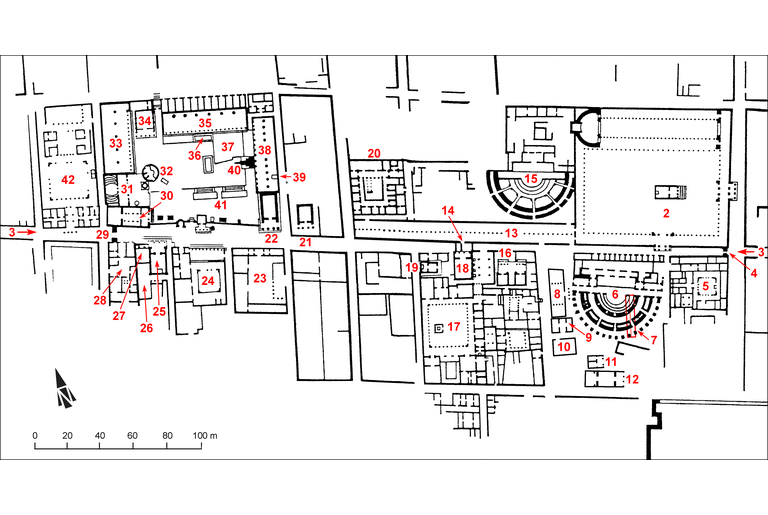Private honors
IGCyr097500
Trismegistos ID: 738492
Source Description
Support
Rectangular white marble base, later reused for IGCyr097400 on the opposite side. On top, a circular hole near the right edge and two dovetail holes at left near fore and back edges: they might date either to the first or the second use or even after them. The base was slightly re-cut at right after its second use. The estimated original width of the base can be inferred from the layout and was about 1.01 (present dimensions 0.87; 0.29;0.62).
Layout
Inscribed in two lines on front face, symmetrically along vertical axis of the original width; it is exacltly this layout which allows us to estimate the above mentioned original width.
Letters
0.035; careful lettering, slanting sigma, narrow epsilon, short vertical right stroke of pi.
Place of Origin
Date
End of fourth century B.C.
Findspot
Later recorded Location
Seen by Pugliese Carratelli in 1960 at Cyrene pleiades; HGL : in the so-called Temple of Hermes .
Last recorded Location
Seen by C. Dobias-Lalou in 2010 at the same place.
Text constituted from
Transcription from stone (CDL).
Bibliography
Oliverio, Taccuini inediti Oliverio, G., Taccuini inediti - see in bibliography XVI.11, whence SECir Oliverio, G., Pugliese-Carratelli, G., Morelli, D., 1961-1962, Supplemento Epigrafico Cirenaico, Annuario della Scuola Archeologica di Atene e delle Missioni Italiane in Oriente (ASAA)39-40 (= n.s. 23-24), 219-375 - see in bibliography , 117b (photo).
Apparatus
French translation
Alkandros fils d'Epigénès.
English translation
Alkandros son of Epigenes.
Italian translation
Alkandros figlio di Epigenes.
Commentary
Pugliese Carratelli, at SECir Oliverio, G., Pugliese-Carratelli, G., Morelli, D., 1961-1962, Supplemento Epigrafico Cirenaico, Annuario della Scuola Archeologica di Atene e delle Missioni Italiane in Oriente (ASAA)39-40 (= n.s. 23-24), 219-375 - see in bibliography , said that he had seen the stone in the temple of Hermes and also mentioned from Oliverio's papers that it had been found «nell'Agorà». In fact, it does lay at the South-East corner of that temple, on the edge of the Street of Battos, under a good half meter of soil. So it is doubtful that it has much changed place between 1936 and nowadays. We think that 'Agora' must be taken in a broad sense that is the Quarter of the Agora (i.e. Luni's 'Quartiere dell'Agorà'). Between 1936 and 1960 (date of Pugliese Carratelli's visit) the spot had been cleared through demolishing the late tower built across Battos' Street between the Hall of the Orthostats and the Stoa of Hermes and Heracles.
As to its place in Antiquity, it may be assumed that both its former and later use as support of inscriptions would not have been out of place on the Agora proper or in another place of that area; however, as it has been re-cut later on it is not impossible that its findspot is linked to a third use in the latest phase of the temple of Hermes in the second century A.D. or in the later tower.
Creative Commons Attributions-NonCommercial 4.0 International License.
All citation, reuse or distribution of this work must contain a link back to DOI: http://doi.org/10.6092/UNIBO/IGCYRGVCYR and the filename (IGCyr000000 or GVCyr000), as well as the year of consultation.
